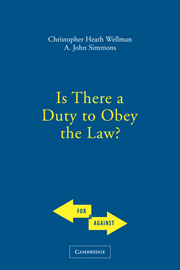5 - The Problem and Its Significance
Published online by Cambridge University Press: 05 June 2012
Summary
In one sense, of course, there is a very easy answer to the question “Is there a duty to obey the law?” Imposing duties is an important part of what the law is for. Legal systems, especially in their criminal law components, specify the duties of those who fall within the relevant jurisdictions, typically backing those assignments of duty with the threat of legal sanction for nonperformance. So, of course, there is (at least normally) a duty to obey the law. But the duty at issue in this easy answer to our question is a legal duty, a duty internal to the system of norms that is law. These legal duties are just one of many kinds of duties internal to many kinds of normative systems, from small clubs and associations to societal codes of conduct. All such duties can be referred to as “institutional,” “positional,” or “conventional” duties. The existence of these kinds of duties is a simple function of what is required by the rules or conventions according to which the institutions or organizations operate.
The question to be addressed here, however, has to do not with the existence of such institutional duties (which nobody questions), but rather with their moral weight. Our question is whether or not there is a moral duty to discharge our assigned legal duties, and if so, why. We want to know whether there is an external, neutral moral duty (or obligation) to discharge the internal duties imposed by law.
- Type
- Chapter
- Information
- Is There a Duty to Obey the Law? , pp. 93 - 101Publisher: Cambridge University PressPrint publication year: 2005
- 1
- Cited by



